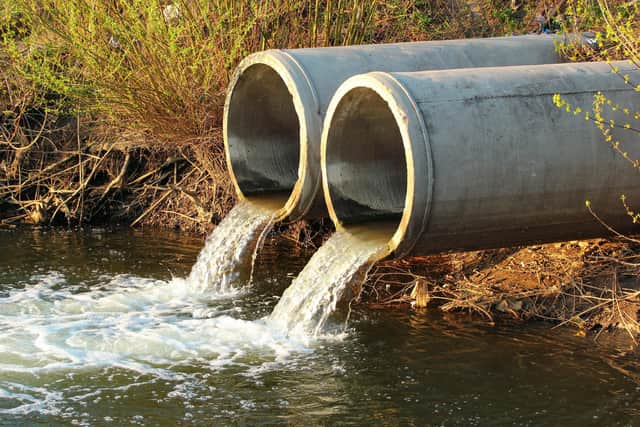The number of hours United Utilities released sewage into Lancashire's waterways more than doubled last year
and live on Freeview channel 276
The number of hours sewage was released into Lancashire's waterways more than doubled last year, new figures show.
The figures show the number of hours of sewage spills from water companies across England has doubled over the past year – with the Environment Agency saying wet weather may be to blame.
Advertisement
Hide AdAdvertisement
Hide AdStorm overflows are used when the water system becomes overloaded, such as after heavy rain or from problems with the sewage network.
Data from the Environment Agency shows sewage from storm overflows was flowing into water bodies in:
- Preston for 10,265 hours in 2023, during 1,488 spills. This was up from 3,639 hours recorded the year before, when there were 739 spills in the area.
- South Ribble for 8,189 hours in 2023, during 1,551 spills. This was up from 4,002 hours recorded the year before, when there were 1,094 spills in the area.
Advertisement
Hide AdAdvertisement
Hide Ad- Chorley for 13,942 hours in 2023, during 2,294 spills. This was up from 6,882 hours recorded the year before, when there were 1,290 spills in the area.
- Lancaster for 16,164 hours in 2023, during 1,870 spills. This was up from 13,653 hours recorded the year before, when there were 1,459 spills in the area.
- West Lancashire for 8,587 hours in 2023, during 1,458 spills. This was up from 3,548 hours recorded the year before, when there were 507 spills in the area.
- Wyre for 6,977 hours in 2023, during 1,080 spills. This was up from 2,240 hours recorded the year before, when there were 593 spills in the area.
Advertisement
Hide AdAdvertisement
Hide Ad- Fylde for 7,711 hours in 2023, during 1,372 spills. This was up from 4,713 hours recorded the year before, when there were 1,023 spills in the area.
- Blackpool for 260 hours in 2023, during 105 spills. This was down slightly from 290 hours recorded the year before, when there were 52 spills in the area.
All of these were from facilities operated by United Utilities.
These figures cover the original location sewage was discharged into the environment – the area might also be impacted by sewage released upstream or in shared water bodies, or from different parts of the coast.


Advertisement
Hide AdAdvertisement
Hide AdMeanwhile, England saw a massive rise in both the number of spills and how long sewage was discharged for.
Last year 3.6 million hours were recorded – with less than 1.8 million hours in 2022 – while the number of spills rose from 301,000 to 464,000.
The Environment Agency said this rise may be partly due to the country experiencing its sixth-wettest year on record.
But James Wallace, chief executive of campaign group River Action, said water companies have "run amok" with their customers' money.
Advertisement
Hide AdAdvertisement
Hide Ad"The scale of the discharges by water companies is a final indictment of a failing industry," he said.
Sienna Somers, nature campaigner at Friends of the Earth, said: "Scandalous inaction by water companies has pushed our ecosystems to the brink and is putting our health at risk.
"But the real sewage scandal is our Government’s pursuit of deregulation and deep cuts to the Environment Agency, which mean even ministers are in the dark about the true extent of water pollution," she added.
A spokesperson for industry body Water UK said: "These results are unacceptable and demonstrate exactly why we urgently need regulatory approval to upgrade our system so it can better cope with the weather.
Advertisement
Hide AdAdvertisement
Hide Ad"We have a plan to sort this out by tripling investment which will cut spills by 40% by 2030 – more than double the Government’s target."
"We now need the regulator Ofwat to give us the green light so that we can get on with it," they urged.
The water companies say they want to triple investment to £10 billion over the period 2025-2030 to tackle the problem, which would be paid for through consumer bills.
The overflow figures were described as "disappointing" but "sadly not surprising" by the Environment Agency’s director of water, Helen Wakeham.
She said: "We are pleased to see record investment from the water sector, but we know it will take time for this to be reflected in spill data – it is a complex issue that won’t be solved overnight."
Comment Guidelines
National World encourages reader discussion on our stories. User feedback, insights and back-and-forth exchanges add a rich layer of context to reporting. Please review our Community Guidelines before commenting.
